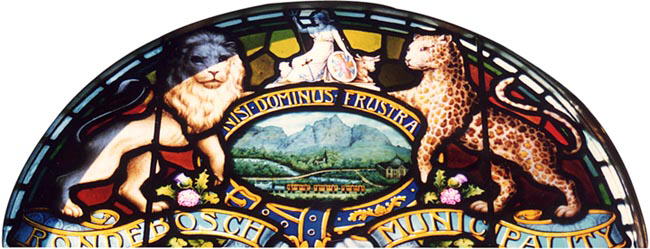Rondebosch
| Heraldry of the World |
| South Africa heraldry portal Civic heraldry of South Africa |
|
RONDEBOSCH
Province : Cape Province
Incorporated into : 1913 Cape Town
| Afrikaans | |
| English | No blazon/translation known. Please click here to send your (heraldic !) blazon or translation |
Origin/meaning
The arms as illustrated are, heraldically speaking, very poor. The arms were probably never registered, but only used by the municipality. I have no official image, but the above image is from a stained-glass window in the town hall (image by Mike Oettle).
The central device is a landscape drawing enclosed in a horizontal oval by a garter (in imitation of the blue garter in the British royal arms). The landscape comprises an accurate depiction of Table Mountain and Devil's Peak with a fanciful middle and foreground. In the middle ground is a forest in which can be seen St Paul's (Anglican) church, reputedly built on the site of the Ronde Doorn Bosje (round thorn bush, a small bushy area from which the name of the town is derived). Below the forest is the north-south Main Road that links the southern suburbs of Cape Town (originally the very first wagon road in the colony) crossing the Liesbeek River on a bridge and intersecting with the eastward road into lower Rondebosch. At right is the Town Hall with a dome that was in fact never added to the structure. (The building actually stands on the right bank of the river, not the left bank as shown.) In the foreground is the steam train that ran to Wynberg on one of the first railways built in the colony.
The garter is inscribed with the motto "Nisi dominus frustra".
The crest is the symbolic figure of Britannia, wearing a crested helmet, holding an oval shield of the British Union Flag and a trident. She is flanked by a sheep (dexter) and a cow (sinister). Britannia symbolises the overwhelmingly British character of Rondebosch in the late 19th century, despite its Dutch origins, and the livestock stand for the town's agricultural beginnings.
The supporters, a lion (dexter) and a (natural) leopard (sinister), depict wildlife once found in the vicinity. They stand on a scroll inscribed "Rondebosch Municipality" and between their feet are floral emblems, (pink) thistles for Scotland and pink roses (presumably in error, since they probably are intended to be the Tudor rose of England, combining red and white in a single blossom).
Contact and Support
Partners:
Your logo here ?
Contact us
© since 1995, Heraldry of the World, Ralf Hartemink 
Index of the site
Literature : Information send by Mike Oettle (pmoettle@tmecl.co.za), Scan courtesy of the Evening Post, Port Elizabeth












